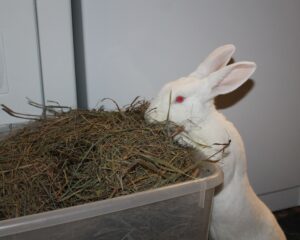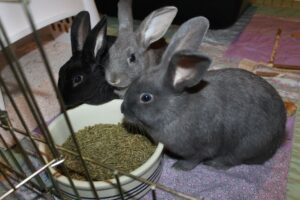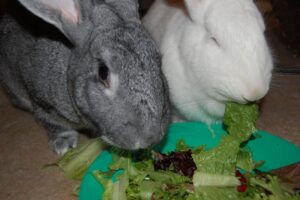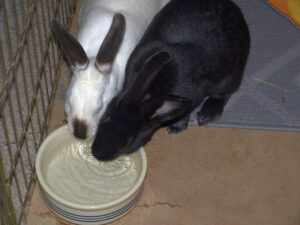Hay

Rabbits need unlimited hay for optimal health. Hay provides entertainment, is an essential fiber source for keeping teeth worn, and is crucial in providing the roughage that allows for proper digestion. Grass hays (ex: timothy, orchard, brome, oat, marsh) are preferred because they are lower in calcium and protein. Alfalfa and clover hays are too rich in protein and calcium for adult house rabbits and can cause health problems. (Rabbits under 10 months of age may benefit from the extra protein and calcium in alfalfa hay.) Any hay is better than no hay! Hay in a litter pan also encourages good toilet training, as rabbits are comfortable pooping in the place where they eat. Loose hay is better than hay cubes because the long strands help propel ingested fur through the gut. Hay cubes should only be used as treats.
Pellets

Pellets are a good complement to a diet of hay and fresh vegetables to guarantee adequate nutrition. However, most pellets are designed for meat or breeding rabbits and are too rich for house rabbits. Chose a pellet that is high in fiber (>18%), and low in protein (<14%), calcium (<0.9%) and fat (<2%). Excellent choices include Oxbow’s Rabbit Essentials (www.oxbowanimalhealth.com), Small Pet Select Timothy Based Rabbit Food (shop.smallpetselect.com/products/premium-rabbit-food-pellets), Supreme Science Selective House Rabbit Food (https://supremepetfoods.us/products/science-selective-house-rabbit-food). Some pellets contain animal-derived ingredients. Be sure to check the label if that is important to you. Sometimes rabbits become accustomed to a pellet and will stop eating if a new brand is introduced. To switch pellets, gradually mix the new pellets in with the old.
Some pellet mixes contain seeds, grains, dried corn, or dehydrated vegetables. These are dangerous for your rabbit because the seeds and grains are poorly digested. Rabbits have died from seed-induced intestinal blockage. These diets are too rich and are the equivalent of a human eating fast food daily.
Rabbits under 6 months old are still growing and should be fed unlimited hay and pellets and some vegetables. For adult rabbits, pellets should always be rationed because overfeeding can cause serious health problems. Smaller rabbits have a faster metabolism and less efficient digestion than do large rabbits; they may need to be fed more per pound than would a large rabbit. Angoras need more pellets per pound because of their fur; mini-rex rabbits have a tendency to plumpness and may need to be fed less. The following guidelines are suggested:
- 2-4 lb body weight: ¼ cup daily
- 4-7 lb body weight: ½ cup daily
- 7-10 lb body weight: ½ – ¾ cup daily
- 11-15 lb body weight: ¾ -1 cup daily
For some sensitive rabbits, pellets can cause digestive upset. Some rabbits need reduced calcium intake because of urinary stone formation. You may hear it suggested to stop pellets in these situations. Opinions on this vary. It is important to talk with a qualified veterinary (or two) about the pros and cons of reducing or eliminating pellets from the rabbit’s diet.
Vegetables
Fresh vegetables are an important part of a healthy rabbit’s diet. Avoid vegetables that are rich in sugar and starches (peas, potatoes, corn), because they can cause intestinal problems. Experiment and see which veggies your rabbit likes. Offer him several and give rabbit a chance to taste them. It is best to introduce new vegetables one at a time. This way, if you notice a change in rabbit’s health or poops, you know which vegetable might be the cause.

Some veggies to try include cilantro, parsley (flat- and curly-leaf), mint leaves, carrot tops, beet tops, radish tops, radicchio, endive, escaroles, broccoli sprouts, alfalfa sprouts, kale, spinach, unsprayed and washed dandelion and violet leaves, dark green lettuce (never iceberg), collard greens, chopped celery, green pepper. Depending on your rabbit’s size and how much pellets he eats, you can safely feed about ½ to 2 cups daily. Include at least 4-5 different types per meal, if possible, to provide nutritional variety. Prepared spring mix or mesclun mix offer blends of several types of dark lettuces and herbs. Be aware that iceberg lettuce is mostly water and can cause diarrhea; carrots are sugar-rich and may cause intestinal problems in some rabbits. Brassicas (Brussels sprouts, broccoli, cauliflower, cabbage, kohlrabi, mustard greens) may cause gas and soft, smelly poops. Provide them in limited amounts.
For a list of suggested vegetables to feed your rabbit, check out this page.
Water
Rabbits need unlimited access to fresh water. Water must be changed daily. We suggest offering water in a heavy crock, rather than a bottle, to encourage drinking. Water is necessary to flush excess calcium from the kidneys and bladder, and it is essential for healthy function of the gut and its bacteria. Rabbits might drink more water in hot, summer months, so plan to fill and change the crock twice per day if it is small.

Treats
Many pet stores sell treats disguised as “healthy” choices; most of these are fat- and sugar-rich and are not healthy at all. Any treat that lists flour or sugar as a main ingredient is a no-no. The best treats are inexpensive, unprocessed ones: a small apple slice, a slice of banana, 2-3 raisins, a dried and unsweetened cherry or strawberry, a pinch of whole oats, a dish of cooled herbal tea, a small piece of carrot, or spoonful of fresh apple cider. Treats are a fun way to bond with your rabbit, a good way to monitor appetite, and serve as a nice reward when medicine has to be given.
Vitamins, Salt or Mineral Block, Rabbit Supplements and “Enhancers”
These are unnecessary if the rabbit is receiving a balanced diet of hay, green-leafy vegetables, and a good quality pellet food fed in limited amounts.
Flowers
These are flowers your rabbit may enjoy as a treat: dandelion, red clover, chamomile, hibiscus, rosehips, and violets with seeds removed. Always be sure they are either grown without chemical sprays and pesticides, or buy them dried from a reliable vendor.
For a list of edible flowers for rabbit, see this page.
For a list of toxic plants to never feed your rabbit, visit our online Library.
